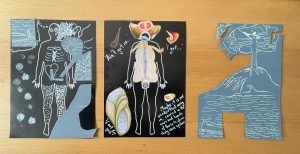Dr Lisa Whittaker (KCL) and Dr Samantha Terry (KCL) have won City of London Centre funding for their Patient and Public Involvement and Engagement (PPIE) initiative to create a collaborative art project titled ‘What does radiotherapy mean to you?’
The project will bring together people who have had radiotherapy, their family members or carers, radiation researchers and therapeutic radiographers. They will be supported by artist-facilitator Liane Harris to create works of art about their experience of radiotherapy. The work is being conducted as part of Cancer Research UK RadNet City of London.
Interview with Dr Lisa Whittaker (KCL) and Dr Samantha Terry (KCL)
 What gave you the idea for an art project?
What gave you the idea for an art project?
We feel that using art really helps unlock new conversations, because it’s a great leveller – even people who don’t think they’re ‘good’ at art can do some doodling and see where it takes them. We all start at a similar baseline, and we as researchers participate too. Plus we had taken a similar approach in other projects, and wanted to apply it at RadNet.
You have now held your first workshop – how did participants respond?
It went really well! The conversations between participants had depth. Using art enables greater self-reflection, possibly on a subconscious level. Participants shared their lived experience, and shared things they didn’t expect they would talk about. One person revealed the ongoing impact of radiotherapy on the dominant side of their body, prompted by the physicality of making art.
How do you build relationships with your PPIE participants?
Regular, open and honest communication makes participants feel more comfortable, and it’s crucial that there is two-way conversation. We clearly set out our intentions as researchers, we send our pictures and biographies in advance, and share our own experiences. We create a WhatsApp group where participants can ask questions, and get to know us and each other, which really helps everyone feel connected.
We speak to our participants one-to-one to explain how much we value their contributions, and why we pay them even if they are doing it out of the good of their hearts. It’s important that we also feed back to them about what we’ve done with their contribution, and that they are co-authors on anything we publish.
Did anything surprise you during the first workshop about people’s experiences of radiotherapy specifically?
We hear a lot about ongoing side effects, including people who speak about their treatment as if it were yesterday, when actually it was a while ago. Understanding this helps us to raise awareness, and has informed future research projects.
Having ongoing relationships with our participants gives richness and context – for example, we have one participant whose self-confidence has increased so much during their recovery.
In fact, participants have told us that PPIE can help them deal with their experiences. They appreciate the opportunity to meet people who have had similar treatment and who “get it”, and often make friends and stay in touch. Some find that formulating their thoughts and feelings during PPIE exercises helps them speak to their oncologists.
What impact do you hope the project will have?
Ultimately, we’re hoping to create something that will benefit anyone receiving radiotherapy, their loved ones, researchers and clinicians. We also want to reach new audiences and help them to see radiotherapy with fresh eyes.
For now, though, we’re in the moment and not trying to predict the outcome. This mentality is important, and we’re grateful for the longevity of funding from the City of London Centre which will enable us to see the project and its impact through.
